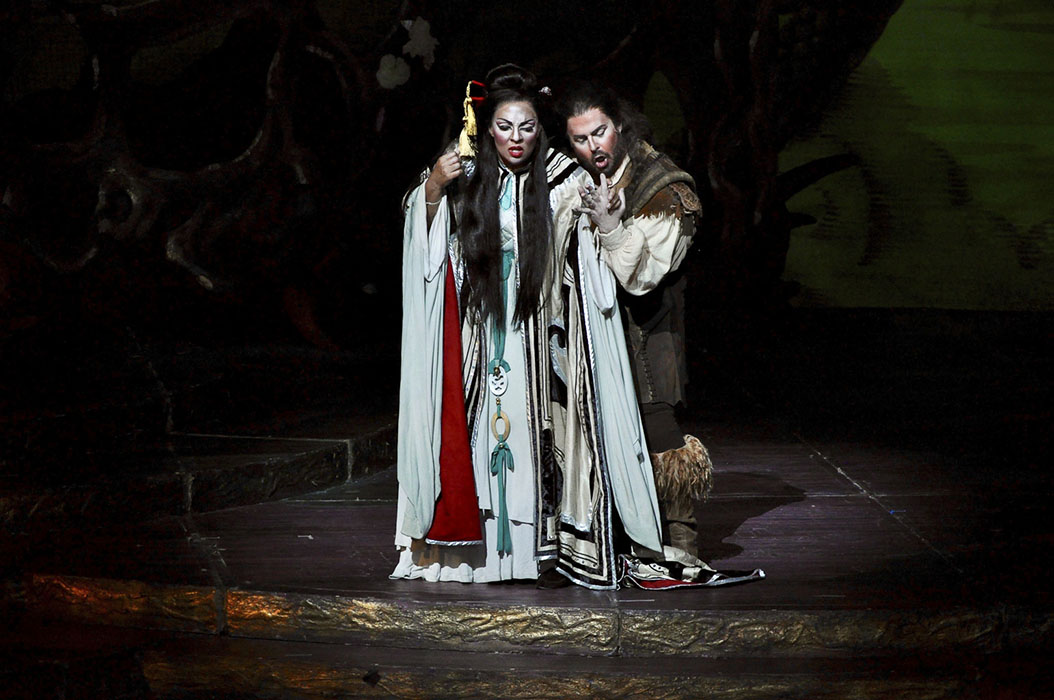Knoxville Civic Auditorium
Friday, February 23 at 7:30 PM • Sunday, February 25 at 2:30 PM
Tickets and Information
It is a fact that opera need not be produced at the highest and loftiest levels of expense in order to be artistically interesting and successful. This claim has certainly been validated by opera companies like Knoxville Opera and others that operate in the environment of medium-size cities or regional entities. That is not to say that such production doesn’t require ingenuity, the setting of painful priorities, and regular compromise. However, artistic vision can often overcome the downside of compromise, and successful companies find a way to lure talented artists, even if they can’t afford the top fees. Successful companies also find a way to develop their local opera community, not just appeal to the biggest donors.
Nevertheless, there are still compromises. Singers booked into regional opera productions may feel a bit like traveling troubadours of a sort at times, spending a month here, a few weeks there, regularly making adjustments to new and different musicians, directors, and venues. However, sometimes the stars do align and more ideal situations present themselves. That is the case with the coming Knoxville Opera production of Puccini’s Turandot. In the title role—and making her debut with the company—is soprano Othalie Graham. She is joining tenor Jonathan Burton as Calàf and stage director John Hoomes in a reunion of sorts—the three did the large production of Turandot for Nashville Opera in 2015.
Hoomes has been the artistic director of Nashville Opera since 1995, but has also been an active freelance stage director in opera and musical theatre. In that freelance role, he has worked with Graham on several productions of Turandot in different cities.
“John Hoomes is one of my favorite directors,” proclaims Graham. “I’ve worked with him quite a few times before. We’ve done this opera a few times together and we’ve also done La Fanciulla del West [The Girl of the Golden West] a couple of times as well. We know how each other works, and how that enables discovering new things in the character. And every time I do this role, I personally try to find new things in her. But, it’s also nice to have a director that helps to bring out those new things.”
Burton has become a familiar face and a welcome voice for Knoxville Opera. This is his third production for KO, following Il Trovatore in 2015 and Tosca in 2016. He agrees that working with familiar singers and directors has notable advantages.

“It’s one of the rare luxuries that is afforded to the traveling opera singer,” Burton admits. “It’s nice to be back with a familiar cast and director, not to say that things aren’t new every time or you don’t discover new things. But, you are with people you are already comfortable with and you already know their philosophy, their outlooks. It probably takes the first two weeks of mental adjustment out of the equation. But the challenge of being with folks I’ve been with before is pretending I haven’t.”
There are also notable advantages for singers in getting repeat opportunities to make vocal adjustments and develop characterizations.
“This time,” says Graham, “I’m trying to add softer moments to the character, especially in her pleading to her father with actually softer vocal moments. And, that’s also important in keeping the voice pliable and supple. Longevity, that’s the goal. My voice is naturally big, so I don’t worry about volume, but I really try to focus on singing as beautifully as possible—to keep the voice lean and high and beautiful, that’s the goal.”
Having learned from those previous experiences, Graham feels a need to temper the reputation of Turandot as the ultimate “ice queen.”
“I never met a high note I didn’t like, that’s for sure! So that’s helpful in this role. I love the vulnerability that I believe is important to have in the character. That way, she stays young both vocally and physically. Even though she has this hard-shell exterior, I believe there has to be a few glimpses of Turandot’s soft under-belly. If not, it’s not really believable when she, all of a sudden, kisses Calàf. That just wouldn’t happen. So, I think it is important for her to have a little undercurrent of beauty, and that also helps you vocally.”
In the role of Calàf, Burton not only has the responsibility of illuminating the Prince sympathetically, but also of tingling spines with the Act III “Nessun dorma,” perhaps the most iconic aria in the operatic repertoire thanks to the late tenor Luciano Pavarotti —and a dozen TV commercials. On a side note, Burton and Graham will also be singing their roles in a June concert version of Turandot for the Detroit Symphony Orchestra.
“It’s Maestro Leonard Slatkin’s last concert with the DSO,” Burton explains. “ I feel honored to have been selected for it. Two performances and one of them will be for television. It ought to be a pretty big to-do!”
In order to accommodate the scenic grandeur requirements of Turandot, Knoxville Opera is moving to the Civic Auditorium with its larger stage, larger orchestra pit, and larger seating capacity. KO will also be in the Civic for its spring production of Verdi’s Aida.
KO executive director Brian Salesky is serving as musical director and conductor for the production. Making a debut with the company is Yunnie Park in the role of Liù; Raymond Aceto will be singing the role of Timur.
Filling out the cast is mix of new faces and voices, and familiar ones to the Knoxville audience: Ping (Brandon Hendrickson), Pang (Darius Thomas), Pong (Andrew Skoog), Altoum (Harry House), and a Mandarin (Michael A. Rodgers).








